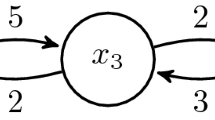Abstract
This paper characterizes strategy-proof social choice functions (SCFs), the outcome of which are multiple public goods. Feasible alternatives belong to subsets of a product set \({A_{1}\times \cdots \times A_{m}}\) . The SCFs are not necessarily “onto”, but the weaker requirement, that every element in each category of public goods A k is attained at some preference profile, is imposed instead. Admissible preferences are arbitrary rankings of the goods in the various categories, while a separability restriction concerning preferences among the various categories is assumed. It is found that the range of the SCF is uniquely decomposed into a product set \({B_{1}\times \cdots \times B_{q},}\) in general coarser than the original product set, and that the SCF must be dictatorial on each component B l . If the range cannot be decomposed, a form of the Gibbard–Satterthwaite theorem with a restricted preference domain is obtained.
Similar content being viewed by others
References
Answal N, Chatterji S, Sen A (2003) Dictatorial domains. Econ Theory 22:45–62
Barberà S, Sonnenschein H, Zhou L (1991) Voting by committees. Econometrica 59:595–609
Barberà S, Gul F, Stachetti E (1993) Generalized median voter schemes and committees. J Econ Theory 61:262–289
Barberà S, Massó J, Neme A (1997) Voting under constraints. J Econ Theory 76:298–321
Barberà S, Massó J, Serizawa S (1998) Strategy-proof voting on compact ranges. Games Econ Behav 25:272–291
Barberà S, Massó J, Neme A (2005) Voting by committees under constraints. J Econ Theory 122:185–205
Border KC, Jordan JS (1983) Straightforward elections, unanimity and phantom voters. Rev Econ Stud 50:153–170
Chichilnisky G, Heal GM (1997) The geometry of implementation: a necessary and sufficient condition for straightforward games. Soc Choice Welf 14:259–294
Gibbard A (1973) Manipulation of voting schemes: a general result. Econometrica 41:587–601
Le Breton M, Sen A (1999) Separable preferences, strategyproofness, and decomposability. Econometrica 67:605–628
Le Breton M, Weymark JA (1999) Strategy-proof social choice with continuous separable preferences. J Math Econ 32:47–85
Satterthwaite MA (1975) Strategy-proofness and Arrow’s conditions: existence and correspondence theorems for voting procedures and social welfare functions. J Econ Theory 10:187–217
Sen AK (1970) The impossibility of a paretian liberal. J pol Econ 78:152–157
Serizawa S (1996) An impossibility theorem in pure public goods economies with feasibility constraints: voting by committees in non-rectangular feasible sets. Jpn Econ Rev 47:368–383
Sprumont Y (1995) Strategyproof collective choice in economic and political environments. Can J Econ 28:68–107
Weymark JA (1999) Decomposable strategy-proof social choice functions. Jpn Econ Rev 50:343–355
Author information
Authors and Affiliations
Corresponding author
Rights and permissions
About this article
Cite this article
Svensson, LG., Torstensson, P. Strategy-proof allocation of multiple public goods. Soc Choice Welfare 30, 181–196 (2008). https://doi.org/10.1007/s00355-007-0221-8
Received:
Accepted:
Published:
Issue Date:
DOI: https://doi.org/10.1007/s00355-007-0221-8




